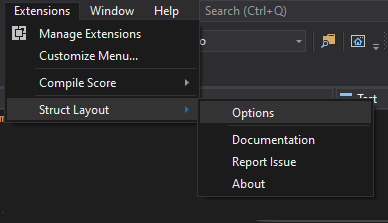-
Notifications
You must be signed in to change notification settings - Fork 22
Configurations
This is the help section to setup the Extension options.
Because each solution might need different extra parameters and different needs, the parser options with the extra parameters are stored in a file called StructLayoutSettings.json next to the solution.
The options page can be opened from:


The options contain the following properties:
| Property | Description | Macros |
|---|---|---|
| Automatic Extraction | If true, it will try to extract from the current solution the architecture, include paths, preprocessor definitions... | No |
| Extra Preprocessor Defintions | Additional preprocessor definitions on top of the auto extracted form the project configuration. | Yes |
| Extra Include Dirs | Additional include directories on top of the auto extracted form the project configuration. | Yes |
| Extra Force Includes | Additional files to force include on top of the auto extracted form the project configuration. | Yes |
| Extra Parser Args | Additional command line arguments passed in to the clang parser. | Yes |
| Enable Warnings | If true, the clang parser will output the warnings found. | No |
| Parser Output Folder | The folder where the layout parser will generate the parsing results. Defaults to *$(ExtensionInstallationDir)Generated*. | Yes |
Some fields accept macros in the form $(MACRO). The valid macros will depend on the nature of the solution, check below for allowed macros.
The additional include directories, force includes and preprocessor definitions can be typed in following the same format as the Visual Studio properties (; separated). Example:
includePathA;${SolutionDir}Folder/;${ProjectDir}...
The extra arguments will be appended at the end. Example:
-std=c++17 -ftime-trace -I${SolutionDir}Folder/
Remember to use the Save button to apply your changes.
⚠️ If the project is using PCHs, due to the fact that most of the struct definitions are in header files, the precompiled headers might need to be forced included.
⚠️ Structs within inline files (.inl) might not work due their nature. Being usually part of another header file, the inline file itself may lack dependency information.
⚠️ Some big projects use Unity builds or similar. This might lead to ill-formed dependency trees in some files, leading to parsing errors when attempting to parse a single unit.
For Visual Studio Projects the Automatic Extraction extracts:
- Active Configuration: x64 or x86
- Active Project Properties: VC++ Directories -> Include Directories
- Active Project Properties: VC++ Directories -> Exclude Directories
- Active Project Properties: C/C++ -> Language -> C++ Language Standard
- Active Project Properties: C/C++ -> General -> Additional Include Directories
- Active Project Properties: C/C++ -> Preprocessor -> Preprocessor Definitions
- Active Project Properties: Advanced -> Forced Include File
- Active Project Properties: NMake -> Additional Include Directories
- Active Project Properties: NMake -> Additional Force Includes
- Active Project Properties: NMake -> Additional Preprocessor Definitions
- Active File Properties: C/C++ -> General -> Additional Include Directories
- Active File Properties: C/C++ -> Preprocessor -> Preprocessor Definitions
- Active File Properties: Advanced -> Forced Include File
Macros available: All MSBuild macros.
There is a basic Visual Studio solution for testing at TestProjects/Regular
When dealing with UE4 projects you also have the following extra macros available:
| Name | Description |
|---|---|
| UE4ModuleName | Fetches the Name of the module that contains the Active File. This is done by moving up folders until finding a folder with a matching .Build.cs. This assumption might be wrong, please feel free to add an issue if there is a better way to detect this. |
More information about Unreal Engine 4 setup and issues here.
When dealing with CMake projects within Visual Studio add the following CMake flag:
CMAKE_EXPORT_COMPILE_COMMANDS / -DCMAKE_EXPORT_COMPILE_COMMANDS=1
The Extension needs to be able to find those compile commands, it will try to figure out its location automatically, but it can also be set explicitly in the options window.
The visual studio default configuration is the following:
Automatic Extraction: Yes
CMake Commands File: $(SolutionDir)out\build\$(Configuration)\compile_commands.json
You can find it also here.
Whenever a file is queried, the app will parse the compile commands list trying to find the best candidate file to extract the parameters from. Cpp files should just pick the same translation unit commands, but header files will try to match a similar file in the same directory or with the same name.
This is an assumption that should work for most of the use cases but it is not guarantee. If anyone has a better solution I would love to hear about it.
Due to the fact that the project does not have an explicit VS project, the MSBuild macros can't be queried, still a small subset has been implemented:
Macros available:
| Name | Description |
|---|---|
| SolutionDir | Opened folder path |
| Configuration | The name of the active configuration |
There is a basic CMake project for testing at TestProjects/CMake
This custom extra macros can be used by any configuration mode:
| Name | Description |
|---|---|
| ExtensionInstallationDir | Folder where this extension got installed in the local machine |